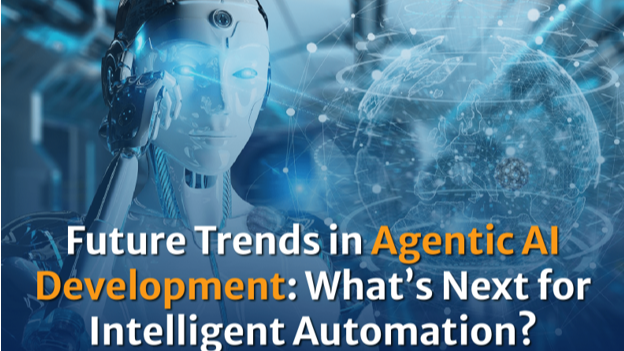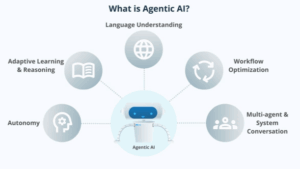We’re entering a new era where Agentic AI intelligent systems capable of making autonomous decisions is no longer science fiction. From self-driving cars to smart virtual assistants, Agentic AI is already reshaping our daily lives.
But what’s next?
In this edition, we explore key trends driving the future of Agentic AI, the industries it will disrupt, and how businesses can prepare to thrive in this evolving landscape.
What Is Agentic AI?
Agentic AI refers to autonomous systems that can learn, adapt, and act independently. These systems use advanced algorithms (like machine learning and reinforcement learning) to optimize performance based on real-time data and interactions with their environment.
7 Trends Shaping the Future of Agentic AI
- Smarter Human-AI Interaction (NLP) Expect breakthroughs in natural language processing, allowing AI to understand tone, context, and emotion making interactions in customer service, healthcare, and education feel more human.
- Explainable AI (XAI) Trust will become critical. Explainable AI will help users and stakeholders understand how and why AI systems make decisions essential in fields like healthcare, finance, and legal services.
- Collaborative AI We’re shifting from AI replacing humans to AI working alongside humans. Expect more systems that enhance creativity, decision-making, and productivity.
- Regenerative AI Next-gen AI will continuously evolve and regenerate its learning processes. This will be key in fields like climate science, urban planning, and smart infrastructure.
- Ethical & Responsible AI As agentic systems become more powerful, ethical design and deployment will take center stage. Companies will need to adopt standards that ensure transparency, fairness, and accountability.
- Federated Learning AI will learn across decentralized devices without compromising privacy. This is a game-changer for sectors handling sensitive data, like healthcare and banking.
- AI + IoT Integration Imagine AI agents that control smart cities, factories, and homes in real time by analyzing data from connected devices. This fusion will drive automation in logistics, manufacturing, and agriculture.
Industries That Will Transform First
- Healthcare:From personalized treatment to AI-assisted diagnostics and robotic surgery
- Finance: Real-time risk analysis, fraud detection, and AI-powered investment tools.
- Retail: Predictive inventory management, personalized shopping, and virtual assistants.
- Manufacturing: Smart robotics and collaborative AI systems optimizing production
- Transportation: Autonomous vehicles, route optimization, and smart traffic systems.
Challenges We Must Address
- Data Privacy & Security: As AI feeds on vast data, protecting user information becomes critical.
- Bias in AI Models: We must work to eliminate algorithmic bias through diverse data and transparent systems.
- Regulatory Pressure: Navigating emerging policies and compliance requirements will be essential for sustainable AI deployment.
How to Prepare for the Agentic AI Future
- Invest in Talent: Train your workforce to adapt and collaborate with AI.
- Foster Innovation: Build partnerships with tech and research institutions.
- Stay Agile: Adopt development models that evolve with technology.
- Design for People: Keep the end-user at the center of your AI strategy.
Final Thought
Agentic AI is not just about automation, it’s about enabling smarter, more adaptive systems that enhance how we live and work. Those who prepare now will lead the industries of tomorrow.




